In the Spotlight

Vidhu Aggarwal
Associate Professor, Rollins University
Orlando, FL Member Since: 2008
About: Vidhu Aggarwal grew up in the Southern US. A Kundiman fellow, her poetry has recently appeared in the The Boston Review, VIDA, and The Missing Slate, and is forthcoming in Black Warrior Review, Chicago Quarterly Review and Saturnalia’s Electric Gurlesque anthology. Her book of poems The Trouble with Humpadori (2016) received the Editor's Choice Prize from The (Great) Indian Poetry Collective.
Photo credit: Manoj Aggarwal
Who encouraged you to be a writer?
I was the first child of parents who immigrated from India and validated my "mastery" of the English language, which they felt was beyond them. In this way, from a very young age, I became the "writer" or expert in English, correcting their correspondence, receiving excessive praise for ordinary language acquisition. For them, I was a "writer," before I was ever a writer—before I could even write. My father, in particular, had goals for me to rewrite the epic Mahabarata and Ramayana into English adaptations, which we would then make into films (he was an engineer who had no access to any film industry folks, so this was truly a stretch). Gorgeous, beautiful, expressive English was a family dream, as perhaps it is for many aspirational immigrants.
What do your books look like once you’ve finished reading them?
I was taught as a kid to have a great reverence for books. No using them as blocks or stepladders. They were "knowledge." I still have this tendency not to dog-ear, mark, or break the spines of my books—however irresistible the urge. I feel that I've done my duty if I can keep them pristine—despite my sticky fingers, my tendency to snack while I read. Nevertheless, certain books follow me around, get crushed from proximity—distended by haphazard bookmarks—in other words, loved to death. I must admit part of me loves the idea of accumulated grime and history, the imprint of multiple readers on books. I also (still) borrow books from libraries or buy secondhand books and enjoy the notes and dog-ear marks, the perverse license other readers must feel! I fetishize the notations of others.
Do you feel influenced by your peers to produce a certain type of creative work, or do you feel free to follow your own interests and passions?
I think we are in a moment in US poetics where there is profusion of differing aesthetics thanks to the emergence of innovative small presses like Action, co.im.press, and Durga, among many others. I'm astounded by the possibilities of wild, engrossing, passionate work. If anything, I feel the necessity of going further in manifold directions with my own work—toward engaging with science fiction, mediascapes, theory. I also think my own engagement with video, sound work, scholarship, and other arts, give me other models and examples of art practice outside of writing.
What is the best lesson that you have learned from a book?
So one of the things I've learned from Bhanu Kapil's "Ban en Banlieue" is that anything can go into a poem. I'm exhilarated by her expansiveness. I remember reading a long time ago in an essay by Sylvia Plath that you cannot put a toothbrush in a poem—the stuff of daily life, or the mundane encounter (though I'm not sure Plath actually followed this tenet). Kapil's prose-poetry is notational and includes pieces from her blog. Ordinary encounter—getting a drink at a conference—has the feeling of intense ritual in her work. I read Kapil to give me permission to put more and more in my own work. I have to work not to censor the everyday in favor of a limited notion of lyric high seriousness.
Would you like to share a project you are currently working on?
I might or might not be working on a series of poems/essays called "Daughter Isoptrope." My father was a civil engineer working in nuclear power plants across the southern US. It is my attempt to move in a more "personal" direction—however fabricated the outcome. In my previous work, I've avoided the personal narrative and have tended to move in more fantastical modes, though I believe that the fantastical can still be intimate. So in this work, I attempt to combine personal origin story with narratives about superpowers via radioactivity.
What is your favorite thing to do when you should be writing, but just can’t find the motivation?
My habit is to turn to other art forms. If I can't write, I draw or take photographs, or make short videos, or cut out phrases from magazines. One time I decided to make collages out of dollar-store materials like stickers. I cut up these neon fish and cat stickers into weaponized goddess figures—and they helped me visualize some of the monstrous figures that ended up in my book The Trouble with Humpadori.
How has AWP helped you in your career and/or creative endeavors?
My experience at AWP encouraged me to start a journal, SPECS, with my friend Jeanne Genis. It introduced me to many presses and journals with a DIY attitude—the dream of one or two people in far flung locations. We wanted SPECS to make a space for innovative poetics out of central Florida that would combine critical and creative practices, and encourage hybrid poetic-prose forms.

